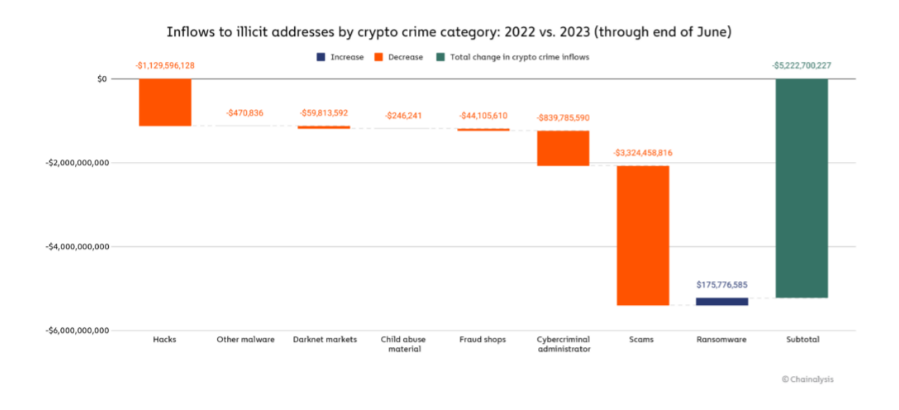Crypto scams have experienced a significant decline of 77% in the first half of 2023, plummeting from a staggering $3.3 billion to $1.1 billion, as shown in a recent report from blockchain intelligence firm, Chainalysis.
This encouraging trend marks the second consecutive year of decreasing scam revenue, reflecting positive developments in the cryptocurrency landscape.
However, in the face of this decline, Chainalysis also highlighted a concerning rise in ransomware revenues, which have reached $449 million year-to-date and could potentially surge to a staggering $939 million by year’s end.
These findings shed light on the evolving nature of crypto-related crimes and emphasize the importance of staying vigilant in the face of emerging threats.

Crypto Scams: A Drastic Decline
Chainalysis, in its recently published Mid-Year Crypto Crime report, highlights a remarkable decline in crypto scams in 2023, a trend that stands out even more because of the simultaneous surge in crypto asset prices.
Typically, positive price movements are accompanied by higher scam revenues, fueled by market exuberance and FOMO-induced vulnerability among potential victims.
However, this year’s drastic decline in scams defies this long-standing trend, signaling a potential shift in the dynamics of cryptocurrency-related fraud. The report also reveals a significant reduction in hacks, amounting to a staggering $1.1 billion decrease compared to the first six months of 2022.
While this decline is encouraging, Chainalysis sounds a cautionary note regarding the utilization of artificial intelligence (AI) tools to promote scams.
The emergence of AI-driven techniques, including the use of deepfakes and other sophisticated methods, poses new challenges in combating fraudulent activities.
Threat Of Ransomware
As for the surge of ransomware attacks, the notable reason, as identified by the report, is the resurgence of “big game hunting” tactics employed by ransomware attackers.
These cybercriminals are strategically targeting large-scale organizations with substantial financial resources, aiming to extract the maximum possible ransom payments from those willing to comply.

The reversal in fortune for these attackers can be attributed to the renewed focus on high-value targets, following a temporary lull in 2022.
Their nefarious activities are now on track to reach their second-highest revenue year on record, trailing just 4.6% behind the peak achieved in 2021 when the total figure amounted to $940 million.
This concerning trend underscores the adaptability and resilience of ransomware attackers. By focusing their efforts on deep-pocketed organizations, they exploit the willingness of these entities to pay exorbitant ransoms to regain control over critical data and systems.
As always Chainalysis highlight the urgent need for robust cybersecurity measures and heightened awareness among organizations.
Featured image from Coeo Solutions







